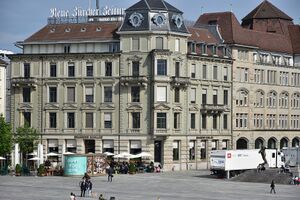Neue Zürcher Zeitung
(Newspaper) | |
|---|---|
 Head office in Zürich | |
 | |
| Formation | 1780 |
| Leader | Neue Zürcher Zeitung/Editor-in-Chief |
| Sponsored by | Google News Initiative |
| Subpage | •Neue Zürcher Zeitung/Editor-in-Chief |
| Swiss newspaper widely read in Germany. Many deep state connections. Gatekeeper. | |
The Neue Zürcher Zeitung is a Swiss newspaper. Because it is written in German, it is also widely read in Germany.
Contents
Reporting
The NZZ reported Hany Farid's claim that social media spreads misinformation about COVID-19.[1]
"Wilder theories"
“A year after the Nord Stream explosions, this question is still unanswered. Evidence points sometimes to Russia, sometimes to Ukraine. In wilder theories, the United States has already been suspected.”
Linda Koponen, Neue Zürcher Zeitung (26 September 2023) [2]
Steering the opposition
In 2024 Swiss Policy Research analyzed the political-strategic goal of the paper, especially in Germany, as follows:
The political-strategic goal, in turn, consists of two components. On the one hand, the NZZ, as a bourgeois-liberal medium, wants to counteract the "eco-socialist cultural revolution" in Germany, which will weaken Germany as a business location in the foreseeable future and thus also endanger the economies of Europe and Switzerland. The NZZ also represents positions that are usually no longer found in traditional German media and that are therefore in demand among bourgeois and conservative readers ("the other view").
On the other hand, as an internationally and transatlantically oriented medium of the Swiss financial center, the NZZ would like to counteract the nationally conservative and NATO-skeptical tendencies in German politics that could endanger globalization and US hegemony. For this reason, NZZ reports on geopolitical topics such as Russia, China or the Middle East differ little from reports of traditional German media. Even with topics such as corona or global migration, the NZZ could and can ultimately only superficially distinguish itself.
It is obvious that these two divergent political goals require a journalistic balancing act, from which various irritations and complications arise: on the one hand, the NZZ wants to win over national-conservative German readers and thus irritates liberal German readers and commentators, on the other hand, the NZZ would like to "re-educate" its national-conservative readers in certain points and thus sometimes irritates them.[3]
Deep state connections
Many editors-in-chief as well as other editors and journalists (see below) have attended Bilderberg conferences as well as the secretive and spooky le Cercle.
Character assassinations
In 2013 then foreign editor Eric Gujer wrote that Edward Snowden is not a whistleblower, but a "traitor".[4][5]
According to NZZ, Daniele Ganser, "a Swiss historian and an icon of conspiracy theorists, fills the halls in Germany – this time in the role of being soft on Putin...Ganser used to be a serious historian, doctor of philosophy, senior researcher at ETH Zurich. Now he advises alternative media ("they re-connect the neurons!"), tells that he did not vaccinated (huge applause) and recommends going for a walk in the forest if the media start to scare you too much again."[6]
In 2024, NZZ wrote "Julian Assange is celebrated as a freedom fighter. But he did not care about ethical standards, and his publications endangered lives", and under the subheadline "In the service of Russia?" that "When it came to Russia, Julian Assange looked away."[7]
In July 2024, NZZ started a defamation campaign against General Harald Kujat as "pro-Moscow", "Soviet general" who "serve the Kremlin narrative" and "sometimes doesn't take facts and details so precisely". Kujat had called for a negotiated peace in the Ukraine war.[8][9] and said that the West had prevented a peace agreement between Vladimir Putin and Volodimir Zelensky in the spring of 2022. Kujat was the highest ranked German officer, Chief of Staff of the German armed forces, from 2000 to 2002, and Chairman of the NATO Military Committee from 2002 to 2005.[10]
In January 2025, it referred to imprisoned journalist (and self-avowed "non-religious person") Ali Abunimah as an "Islamist"[11], "dog whistling that Ali's an extremist and potential terrorist"[12], in a report on his arrest. Abunimah is an American-Palestinian author and director of the online newspaper Electronic Intifada, and was invited by The Palestine Committee Zurich to an event. Swiss police had "after being made aware of it" by Zionist groups, submitted an application to for an entry ban, and detained him when he showed up[13]
Employees on Wikispooks
| Employee | Job | Appointed | End | Description |
|---|---|---|---|---|
| Walter Berchtold | Financial Editor | 1938 | 1945 | Later Bilderberg/1969 and Bilderberg/1970 |
| Felix Graf | Chief Executive Officer | June 2018 | ||
| Christian Kind | Foreign editor | 1981 | 1992 | Bilderberg 1979 and 1989 |
| Ernst Kux | Foreign Editor | 1965 | 1990 | Sovietologist and Foreign Editor of Neue Zürcher Zeitung who attended Le Cercle |
| Willy Linder | Business editor | 1954 | 1987 | Attended Bilderberg/1977 |
| Erich Mettler | Foreign desk editor | 1968 | 1980 | Attended Bilderberg/1973 |
Sponsor
| Event | Description |
|---|---|
| Google News Initiative | Google and the deep state buying domination over corporate media and creating tools to censor independent voices. |
References
- ↑ https://www.nzz.ch/english/social-media-spreads-misinformation-berkeley-researcher-says-ld.1638804
- ↑ https://click.email.nzz.ch/?qs=a66493118810467fedfac9ac71baa35ed889700fdb42c160527d02d01789dbc5803815cfad0de77c3c22aaa03a8c4c77347158799efb10d6
- ↑ https://swprs.org/die-nzz-in-deutschland/
- ↑ https://www.nzz.ch/schweiz/bern-ist-nicht-bagdad-1.18122326
- ↑ https://www.nzz.ch/schweiz/bern-ist-nicht-bagdad-ld.702411
- ↑ https://www.nzz.ch/gesellschaft/ein-abend-mit-verschwoerungstheoretiker-daniele-ganser-ld.1815354
- ↑ https://www.nzz.ch/feuilleton/julian-assange-wird-in-den-medien-als-freiheitskaempfer-gefeiert-doch-ethische-standards-kuemmerten-ihn-nicht-und-seine-publikationen-gefaehrdeten-leben-ld.1836826
- ↑ https://www.nzz.ch/international/harald-kujat-und-seine-kreml-narrative-ein-ehemaliger-nato-general-auf-abwegen-ld.1837619
- ↑ https://www.nzz.ch/podcast/harald-kujat-war-der-hoechste-offizier-der-nato-spricht-er-heute-ueber-den-ukraine-krieg-bedient-er-auch-narrative-des-kremls-ld.1840849
- ↑ https://www.alexander-wallasch.de/gesellschaft/als-die-nzz-mit-einer-diffamierungskampagne-harald-kujat-abschiessen-wollte
- ↑ https://www.nzz.ch/zuerich/radikaler-islamist-sollte-in-zuerich-in-der-zentralwaescherei-auftreten-kantonspolizei-hat-einreisesperre-fuer-ihn-beantragt-mario-fehr-spricht-von-einem-judenhasser-ld.1867964?mktcid=smch&mktcval=twpost_24-01-2025
- ↑ https://twitter.com/KitKlarenberg/status/1883317259810242617#m
- ↑ https://www.nzz.ch/zuerich/radikaler-islamist-sollte-in-zuerich-in-der-zentralwaescherei-auftreten-kantonspolizei-hat-einreisesperre-fuer-ihn-beantragt-mario-fehr-spricht-von-einem-judenhasser-ld.1867964?mktcid=smch&mktcval=twpost_24-01-2025